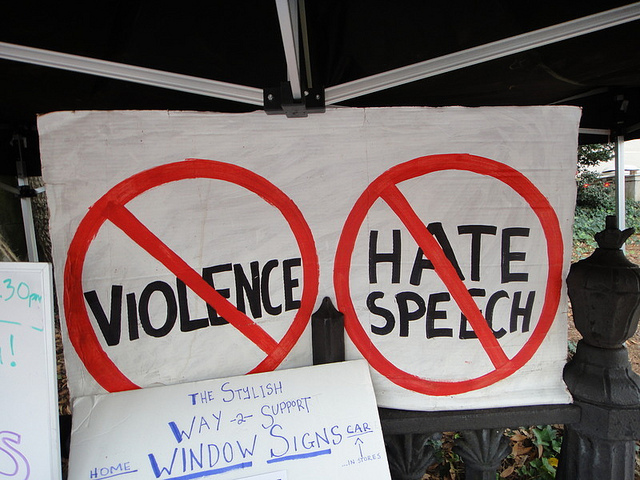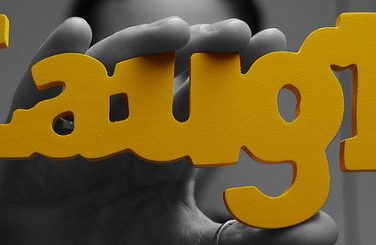Fickle Freedom?
Nowadays, the definition of freedom of speech is about as fickle as Boris Johnson’s political allegiances. It’s not easy to pin down; it yo-yos as much as Renée Zellweger’s dietary habits.
In the postmodern world, this concept is an unruly beast.
What’s more, nobody can say what’s really on their mind without fear of being reprimanded by the PC brigade. As naughty school children push the boundaries to see what they can get away with, in many ways, we’re having to do the same. Is it ‘Ba-Ba Rainbow Sheep’, now? No. Best not. That’ll offend the LGBT community. Better to stick with twinkle, twinkle… Its like meeting the in-laws for the first time: constantly watching your Ps and Qs, desperately trying to fathom out those inane proprieties Grandmother attempted to instill, some years before. What was it she said, again?
Yet, if priggish pretence and supercilious snobbery define the British people, surely freedom of speech, the right to an opinion, and the freedom to voice it, has got to be the cornerstone of European society.
Sit up straight; don’t talk with your mouth full; jolly-well take those elbows off the table!
Ah yes, British etiquette: a mainstay of our culture and heritage. Yet, if priggish pretense and supercilious snobbery define the British people, surely freedom of speech, the right to an opinion and the freedom to voice it, has got to be the cornerstone of European society. This important value is undoubtedly woven deeply within the very fabric of our democracies. Yet, more often than not, you can speak freely but only on the proviso that it doesn’t conflict with my worldview.
There is a puerile sense of: it’s not fair, Mummy!
It’s Generation Snowflake. They’re out in force: stomping about university campuses, waving their self-righteous placards; they’ve taken out their Crayolas and doodled all over the rule-book. ‘Rhodes must fall!’ some of them cry, whilst others campaign for a certain Ms Greer to be denied a platform from which to speak her mind.
I am not saying, not even for one minute, that I personally agree with Germaine Greer — as it happens, I think her views are out-of-touch — but that doesn’t mean she should have her voice stifled, thus preventing it from being challenged in civilised debate. Nor am I saying — though I concede he sports a pretty impressive moustache — that I remotely agree with Cecil Rhodes’ imperialist mentality. Yet I welcome the opportunity to discuss his archaic outlook and, more importantly, learn from it.
(How can we, Britons, expect to right the wrongs of our Colonialist past if we effectively erase the existence of such figures?)
It seems as though my generation are teetering dangerously close to deserving the epithet of censorious cry babies. When the reality is: we have never had it so good. If we’re not careful, we’ll be labeled as moody millennials incapable of intellectual and ‘grown-up’ discussion. Somehow, I don’t think throwing a temper tantrum is going to help us.

The tip of an iceberg?
However, these sprinklings of fresh white snow are merely settling on the tip of the iceberg. That’s right, within the European domain, these supposedly mollycoddled, cottonwool-wrapped youths are not the only ones chucking their dummies out of the pram.
>Furthermore, the problems facing them pale in insignificance when compared to genuine free speech warriors across the continent. A certain Turkish tyrant taking issue with a German comic, and complaining of libel and defamation springs to mind. (Not to mention the less press-release friendly violations of the freedom of the press in Turkey.—Ed.)
I refer, of course, to the recent case of Jan Böhmermann: German satirist and all-round barrel of laughs. He is a man who exudes the kind of sense of humour indicative of his people and does so with unflinching, some may say distasteful, conviction. Recently, his notorious poem on Recep Tayyip Erdoğan brought him into international disrepute.
Some of the poem’s crassest lines – referring to Erdoğan’s professed pedophilia, barefaced bestiality and a stark allusion to his supposedly foul-smelling phallus – probably knock on the door of what is unacceptable. Therefore, far from portraying him as a champion of the European value of free speech, Böhmermann’s words made him out to be a purely pernicious plonker. The poem did – as a regional court in Hamburg ruled – indeed cross a line.
The trouble is: where do we draw the line, these days? Where does free expression wander over into dangerous, deliberately provocative territory?
The trouble is: where do we draw the line, these days? Where does free expression wander over into dangerous, deliberately provocative territory? Charlie Hebdo, for example, is either an admirable publication, bravely confronting the social issues of today, or about as sensitive as Ken Livingstone on a newsroom rampage. (As the ex-mayor of London, it was possibly unwise to for him to continually cite Hitler as a Zionist, insisting and persisting; stubborn as an ass.) However, controversial or not, as a citizen of Europe, surely he was merely exercising his fundamental right to freedom of expression.
Although Erdoğan’s castigatory action against Böhmermann falls within the same ambit as Europe’s student cohort of feet-stomping protestors, it appears as though their whinging coterie don’t know how good they’ve got it. Böhmermann may be incarcerated. His only charge? Defending what he upholds as a pillar of his populace.
I suppose, with this debate, the goalposts are constantly being moved as standards are continually redefined. For me, there are two principal elements at play. One comprises young people who can no longer cope with the idea of anyone having an opinion at variance with their own; the other involves where we, as citizens of Europe, decide the limitations of free expression lie. Ultimately, the European people must decide. The answers won’t come easily; it’s not a process that’ll happen overnight.
Nevertheless, as our continent – and the world – metamorphose into more outward-looking and progressive societies, so must our notion of freedom of speech. Just as Volkswagen, the Goliath of German industry, ought to return to the drawing board – in terms of their tarnished brand image – maybe its time we reinvented the way Europe thinks about this critical issue.
Teaser photo: Kimba Howard(Flickr); Licence: CC BY 2.0










